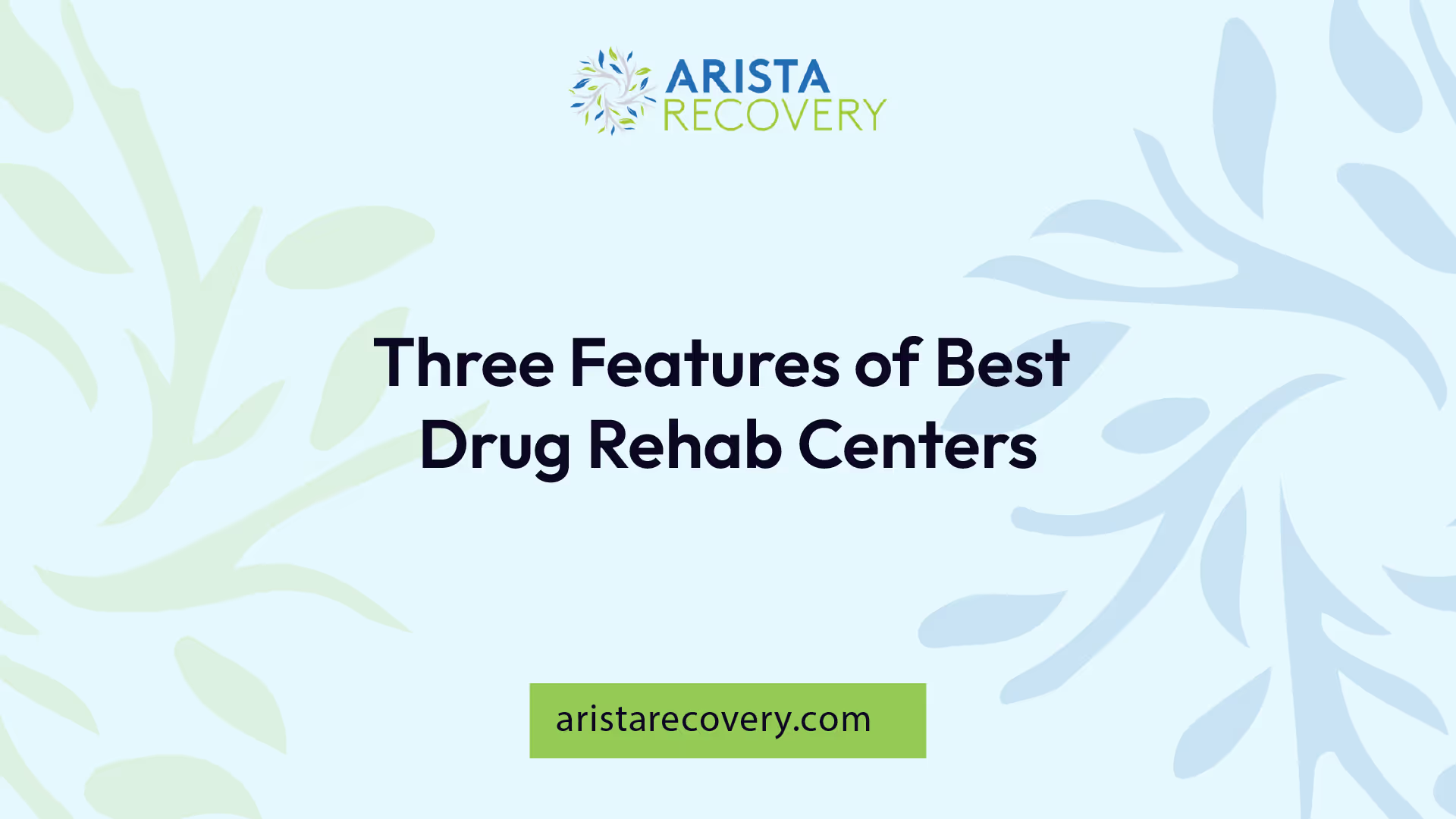Three Features of Best Drug Rehab Centers

Understanding Addiction Treatment
Understanding addiction treatment is vital for effective recovery. Two key aspects of treatment that are often highlighted in top drug rehab centers are individualized treatment approaches and behavioral therapy interventions.

Individualized Treatment Approaches
Addiction treatment must be personalized to address the unique symptoms, underlying causes, and consequences of substance use on an individual's life. Factors such as social functioning, physical and mental health, work, home, school, or legal issues must be considered in developing treatment plans [1].
Individualized treatment approaches involve the following components:
ComponentDescriptionImportanceAssessmentComprehensive evaluation to identify specific needs and challengesHelps tailor treatment effectivelyGoal SettingCollaborative development of achievable treatment goalsProvides direction and motivationContinuous MonitoringRegular assessments to track progress and adjust treatment plansEnsures responsiveness to the changing needs of the individual
Effective treatment often reduces symptoms and helps maintain stability. Conversely, poor or absent treatment is linked to an increase in symptoms and potential relapse [2].
Behavioral Therapy Interventions
Behavioral therapy is another crucial component of addiction treatment. It includes various techniques aimed at modifying detrimental behaviors associated with substance abuse. Cognitive behavioral therapy (CBT) is particularly common, demonstrating lasting positive impacts on patients struggling with misuse of substances.
The advantages of behavioral therapy interventions include:
Therapy TypeDescriptionBenefitsCognitive Behavioral Therapy (CBT)Focuses on identifying and changing negative thought patternsEnhances coping strategies and resilienceContingency ManagementUtilizes positive reinforcement to encourage abstinencePromotes long-term behavioral changesGroup TherapyProvides support and a sense of community among individuals facing similar challengesReduces feelings of isolation and boosts accountability
The primary objective of these interventions is to help individuals achieve and sustain abstinence. Long-term effectiveness is observed in patients who maintain sobriety for two years, resulting in continued abstinence in the following decade. Longer treatment periods and engagement in aftercare or self-help groups significantly contribute to better recovery outcomes [3].
By incorporating individualized treatment approaches and effective behavioral therapy interventions, drug rehab centers create a supportive environment for individuals battling substance addiction, enhancing their chances for successful recovery.
Effective Substance Abuse Treatment
Contingency Management Strategies
Contingency management is an evidence-based approach that has shown effectiveness in treating a variety of substance use disorders, including alcohol, stimulant, opioid, and marijuana addictions. This strategy operates on the principle of providing tangible rewards for individuals who demonstrate abstinence and engage in positive behaviors. By incentivizing healthy choices, contingency management can help reinforce recovery and encourage ongoing participation in treatment programs [1].
Substance Use DisorderType of RewardsExample of Positive BehaviorAlcoholGift cards, vouchersAbstaining from alcohol for a weekStimulantsCash rewardsStaying drug-free during a treatment phaseOpioidsIncentive pointsAttending all counseling sessionsMarijuanaPrizesPassing drug tests
SAMHSA's National Helpline Services
SAMHSA's National Helpline is a crucial resource for individuals and families dealing with mental health and substance use disorders. This free and confidential service operates 24/7, providing treatment referrals and information throughout the year. In 2020, the Helpline received 833,598 calls, which marked a 27% increase from 2019, when it received 656,953 calls.
The helpline connects individuals to local treatment facilities, support groups, and community-based organizations, ensuring that help is never far away. It is important to note that the service does not offer counseling; rather, it is staffed by trained information specialists who assist callers by linking them to relevant resources.
FeatureDetailsAvailability24/7, 365 days a yearCostFree of chargeConfidentialityNo personal information requiredCall Volume (2020)833,598 callsCall Volume Increase (2019-2020)27%
For those seeking support, SAMHSA's National Helpline is a vital tool to navigate treatment options and access necessary resources [4].
Elements of Successful Drug Rehab Centers
Successful drug rehabilitation centers possess key features that enhance the likelihood of recovery. Two essential elements are comprehensive aftercare programs and multidisciplinary staffing models.
Comprehensive Aftercare Programs
An effective aftercare program is critical for maintaining recovery and preventing relapse. The best aftercare programs offer a wide range of services that address not just substance use issues, but also the individual’s physical and mental health, housing, finances, and relationships. An imbalance in any of these areas could increase stress and heighten the risk of relapse.
A comprehensive aftercare program may include the following components:
ComponentDescriptionOngoing TherapyRegular sessions with mental health professionals to address emotional and psychological challenges.Support GroupsParticipation in community support networks to foster connection and shared experiences.Life Skills TrainingWorkshops focused on skills such as budgeting, job readiness, and relationship management.Sober Living ArrangementsHousing options that provide a supportive environment conducive to recovery.
Additionally, the SAMHSA's National Helpline is a crucial resource, providing free, confidential, 24/7 support for individuals and families facing substance use disorders. This service offers referrals to local treatment facilities and community-based organizations [4].
Multidisciplinary Staffing Models
The effectiveness of drug rehab centers significantly depends on their staffing models. Successful centers employ a multidisciplinary approach, engaging professionals with diverse expertise to create a holistic treatment environment. Staff usually includes addiction counselors, psychiatrists, nurses, and social workers, each contributing unique perspectives to patient care.
Key qualifications for staff members include:
RoleRequired QualificationsAddiction CounselorsDegrees in psychology or counseling with specialized certification in addiction treatment.NursesDegrees in nursing with specializations in addiction treatment or psychiatric care.Social WorkersTraining in social work with a focus on mental health and addiction services.
Staff members play pivotal roles in fostering a supportive atmosphere focused on recovery. They provide therapy, support, and individualized care essential for addressing the needs of each patient [5]. This collaborative approach enhances the effectiveness of treatment and supports patients on their road to recovery.
Qualifications of Rehab Center Staff
The qualifications of the staff at drug rehab centers are critical elements that significantly affect the quality of care and the success of the treatment process. Professionals within these centers must meet specific licensing and credential requirements, and they often consist of a mix of medical and mental health professionals.
Licensing and Credential Requirements
Staff members at rehabilitation centers must possess relevant qualifications that align with their specific roles. For instance, nurses typically hold degrees in nursing, often with specializations in addiction treatment or psychiatric care. Meanwhile, counselors are required to have degrees in psychology or counseling, accompanied by specialized certifications in addiction counseling.
RoleRequired QualificationsNursesNursing degree with specialization in addiction treatment or psychiatric careCounselorsDegree in psychology or counseling with specialized certification for addiction counselors
These qualifications ensure that staff members have the educational background necessary to provide effective care and support.
Medical and Mental Health Professionals
The roles within rehab programs range from nursing to counseling, forming an integral part of addressing various aspects of addiction treatment. At centers like Trinity Behavioral Health, staff members play crucial roles in creating a supportive environment for recovery. They offer therapy, support, and individualized care to patients, which is fundamental for long-term recovery.
The expertise of these professionals includes proficiency in evidence-based therapeutic approaches such as Cognitive Behavioral Therapy and Motivational Interviewing. This knowledge enables them to address complex emotional and behavioral issues effectively, contributing significantly to the overall success of the recovery journey [5].
Furthermore, ongoing education is emphasized within these centers, ensuring that staff members remain informed about the latest research and methodologies in drug treatment, thereby maintaining a high standard of care [5]. This commitment helps the facility lead in addiction treatment and recovery.
The qualifications and expertise of the staff at rehab centers are essential for creating effective treatment programs and supporting individuals on their road to recovery.
Tailored Rehabilitation Programs
Tailored rehabilitation programs are essential for effective addiction treatment. These programs focus on creating personalized treatment plans that cater to an individual's unique needs and circumstances.
Personalized Treatment Plans
A personalized treatment plan is developed through a comprehensive assessment of an individual’s physical, mental, and emotional health. This process identifies specific needs and goals, ensuring that the rehabilitation process addresses the root causes of addiction. The benefits of individualized rehab include higher success rates in achieving and maintaining sobriety, improved overall well-being, and targeted effectiveness in addressing addiction.
Benefits of Personalized Treatment PlansHigher success rates in maintaining sobrietyImproved overall well-beingEffectiveness in addressing root causes of addiction
Duration and Effectiveness Factors
The duration of individualized rehabilitation varies based on individual needs and progress. Some programs last a few weeks, while others may extend to several months. The length of treatment is adjusted as needed to achieve the best possible outcome.
Research indicates that long-term effectiveness is particularly notable in patients who remain abstinent for at least 2 years. This not only contributes to sustained recovery but also leads to continued drug and alcohol-free status even after 10 years. The association between longer treatment periods and participation in aftercare or self-help groups further supports better outcomes.
Duration of TreatmentEffectivenessA few weeksInitial stability and assessmentSeveral monthsHigher likelihood of long-term abstinence2 years sobrietySustained recovery and long-term successParticipation in aftercareImproved outcomes
Tailored rehabilitation programs, through personalized treatment plans and an appropriate duration, significantly enhance the effectiveness of addiction treatment. Factors like sustained abstinence and continued support play a key role in the long-term recovery journey.
Treatment Techniques in Rehab Programs
In drug rehabilitation programs, a variety of treatment techniques are essential for supporting individuals in overcoming addiction. Among these techniques, pharmacotherapy and behavioral therapy play pivotal roles, while various treatment settings enhance the recovery experience.
Pharmacotherapy and Behavioral Therapy
Pharmacotherapy involves the use of medication to assist in treating substance use disorders. Medications can help alleviate withdrawal symptoms and reduce cravings, making it easier for clients to focus on their recovery NCBI.
Behavioral therapy, on the other hand, addresses the psychological aspects of addiction. Numerous methods are employed, which may include:
A combination of pharmacotherapy and various behavioral therapies ensures comprehensive treatment for individuals seeking recovery from addiction.
Treatment TechniqueDescriptionPharmacotherapyUse of medications to manage withdrawal symptoms and cravings.Cognitive Behavioral TherapyFocuses on changing negative thought patterns related to substance use.Group TherapyProvides peer support and shared experiences among clients.Marital and Family TherapyInvolves partners and family members to enhance support networks.Relapse PreventionStrategies to help clients identify and cope with triggers that may lead to substance use.
Varied Treatment Settings
The environment where treatment occurs can impact the effectiveness of rehabilitation programs. Different settings offer unique advantages, thereby catering to specific needs and preferences of individuals in recovery.
The choice of treatment setting can depend on various factors such as the severity of the addiction, personal circumstances, and recovery goals. A comprehensive approach, utilizing both pharmacotherapy and behavioral therapy within varied settings, emphasizes holistic care in rehab programs.
References
[2]:
[3]:
[4]:
[5]:
[6]:
You’re not alone in this.
When mental health challenges and addiction intersect, it can feel isolating. At Arista, we offer compassionate, evidence-based, and trauma-informed care to help you heal, grow, and move forward.
You’re not alone in this.
When mental health challenges and addiction intersect, it can feel isolating. At Arista, we offer compassionate, evidence-based, and trauma-informed care to help you heal, grow, and move forward.
Support that moves with you.
You’ve taken a brave first step. At Arista Recovery, we’re here to help you continue with best-in-class care designed for long-term healing and support.
.webp)






